Hashimoto’s Thyroiditis is an autoimmune thyroid condition that affects millions worldwide. It’s a complex disease, one that could cause debilitating symptoms like unexplained weight gain, extreme fatigue, and depression. The interplay of genetic and environmental factors that triggers Hashimoto’s Thyroiditis is just as intricate.
As an experienced Ayurvedic practitioner, my approach to Hashimoto’s is multifaceted, targeting not only the overt symptoms but the underlying triggers and root causes as well. This helps to protect and heal the thyroid for permanent relief.
And this personalised, holistic approach is often what sets Ayurvedic treatment for Hashimoto’s Thyroiditis apart from conventional methods.
But is Hashimoto’s thyroiditis treatable? Can the progression of Hashimoto’s be stopped? Can a natural healing method like Ayurveda effectively manage and possibly even reverse this condition? Let’s find the answers together.
In this post, we will look into the causes, symptoms and Ayurvedic treatment of Hashimoto’s Thyroiditis. We will cover diet, lifestyle and Ayurvedic herbs that can help you to support your thyroid gland and treat Hashimoto in a natural way. This blog aims to arm you with the knowledge and power to regain control over your health and thyroid balance.
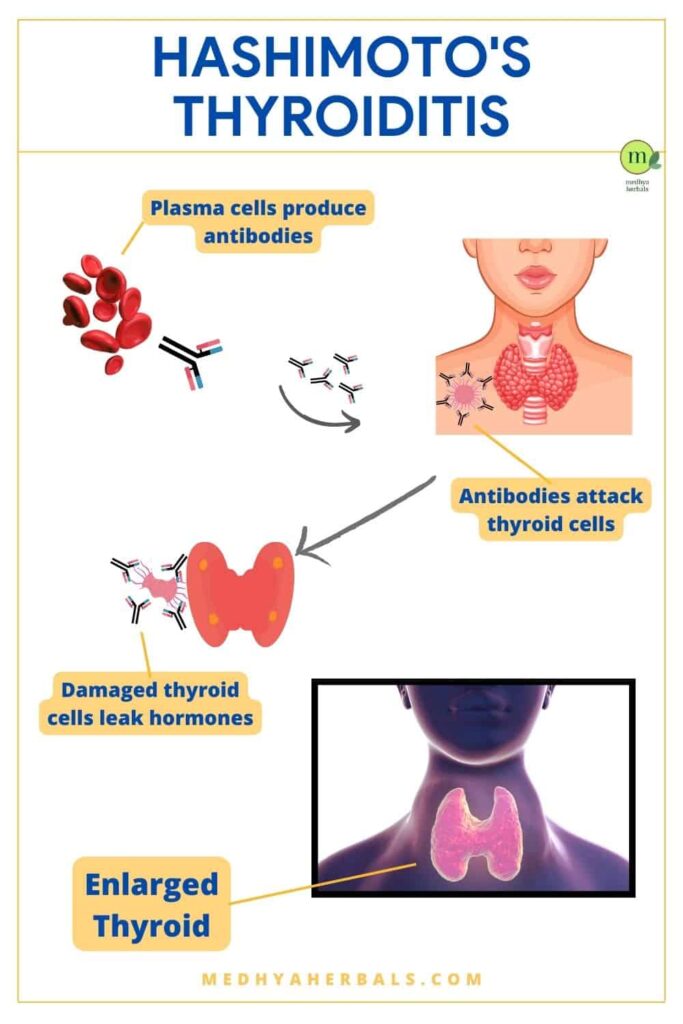
Understanding Hashimoto’s Thyroiditis
Hashimoto’s Thyroiditis, often simply referred to as Hashimoto’s, is an autoimmune disorder affecting the thyroid gland, a small butterfly-shaped gland located at the base of your neck. This gland is part of your endocrine system, and it plays a critical role in regulating numerous metabolic processes in your body.
In Hashimoto’s, your immune system, which typically protects you from foreign invaders such as bacteria and viruses, mistakenly identifies your thyroid gland as an enemy and launches an attack. This assault results in chronic inflammation, leading to an underactive thyroid gland or hypothyroidism.
When your thyroid is underactive, it’s unable to produce adequate levels of thyroid hormones—T3 (triiodothyronine) and T4 (thyroxine). These hormones are vital for maintaining your body’s metabolism. Consequently, a deficiency can affect various body functions, ranging from your heart rate to how quickly you burn calories.

Hashimoto’s Disease Causes and Diagnosis
There are several factors that can increase your risk of developing Hashimoto’s. These include being a woman, as the disease is more common in women; being middle-aged, although it can occur at any age; and having a family history of thyroid or autoimmune disease.
Certain factors can also trigger Hashimoto’s, including genetics, gender, and age. Stress, infection, and certain dietary elements can also contribute to triggering this disease.
Diagnosis of Thyroiditis is made clinically and biochemically. 90 per cent of Hashimoto’s Disease patients have high levels of anti-thyroid peroxidase (TPO) and anti-thyroglobulin (Tg) antibodies. This confirms the autoimmune response or defects in the immune system.
Risk Factors
While thyroid disorders are becoming common these days, Hashimoto Thyroiditis is primarily a health condition that affects women. It is estimated that the ratio of disease occurrence is 7:1 for women and men. Hashimoto can occur in children as well.
Hashimoto’s Disease has many serious complications like infertility, suppurative thyroiditis, recurrent miscarriages, preterm birth, heart failure etc.
Hashimoto’s Thyroiditis Symptoms
Hashimoto’s thyroiditis, also known as Hashimoto’s disease, can present a wide array of symptoms which may vary from person to person and change over time. It’s important to note that some people with Hashimoto’s may not experience any symptoms at all in the early stages of the disease. Here are some common symptoms that may be associated with Hashimoto’s:
- Fatigue: This is one of the most common symptoms of Hashimoto’s. You may feel unusually tired or lack energy.
- Weight gain: Unexpected weight gain is another common symptom. This is due to the decreased metabolism caused by reduced thyroid hormone production.
- Sensitivity to cold: You might feel chilly even in a warm room.
- Joint and muscle pain: Aches and pains in muscles and joints are often reported by those with Hashimoto’s.
- Constipation: An underactive thyroid can lead to slower digestive processes and result in constipation.
- Dry, thinning hair: Your hair might become brittle, dry, and more likely to break off.
- Heavy or irregular menstrual periods: Women with Hashimoto’s may experience changes in their menstrual cycle.
- Depression and slow cognitive function: Hashimoto’s can lead to feelings of depression and can slow your cognitive function, making it more difficult to concentrate or remember things.
- Puffy face: This symptom is due to fluid retention caused by the reduced metabolic rate.
- Goiter (enlarged thyroid): This can present as a swelling at the front of your throat.
- High cholesterol: Often, people with Hashimoto’s have higher levels of “bad” cholesterol.
- Slow heart rate: Reduced levels of thyroid hormone can cause a slower-than-normal heart rate.
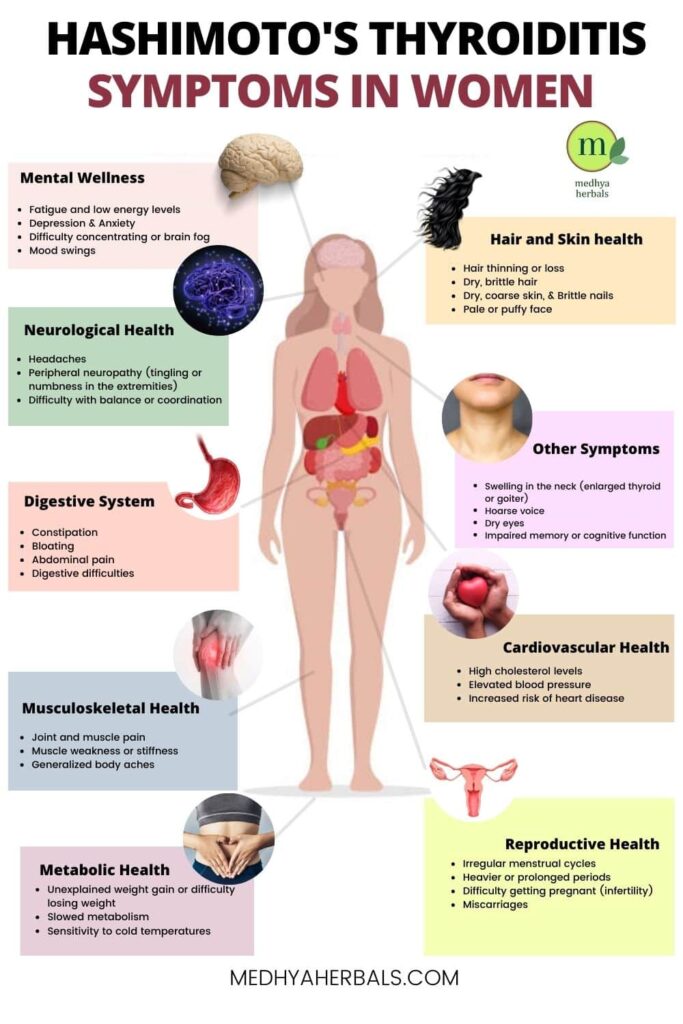
Common Misconceptions
A common misconception about Hashimoto’s is that it’s simply a thyroid problem and can be entirely treated by replacing the deficient thyroid hormones. While thyroid hormone replacement therapy is crucial in managing Hashimoto’s, it does not address the underlying autoimmune attack on the thyroid gland.
Another misconception is that Hashimoto’s is not a severe health concern, but if left untreated, it can lead to serious complications, including heart problems, mental health issues, and myxedema, a rare but potentially fatal condition characterized by intense cold intolerance and drowsiness followed by profound lethargy and unconsciousness.
By developing a deep understanding of Hashimoto’s Thyroiditis, you can better navigate your health journey, armed with the knowledge necessary to make informed decisions about your wellbeing.
Hashimoto’s Thyroiditis in Ayurveda
Ayurveda views Hashimoto’s Thyroiditis not merely as an issue confined to the thyroid gland but as a systemic problem. It identifies an imbalance in the body’s fundamental energies, or “doshas” (Vata, Pitta, Kapha), as the root cause of the disease.
In the case of Hashimoto’s, there is typically an aggravation of Kapha and Vata doshas, leading to hypo-functioning (under-activity) of the thyroid gland. The imbalance of Kapha results in the accumulation of ama (toxins) in the body, which can create a state of low metabolism, lethargy, and weight gain. The aggravated Vata can bring about dryness, leading to symptoms like dry skin and hair.
Additionally, Ayurveda perceives Hashimoto’s as a manifestation of an impaired “Agni” (digestive fire), which leads to the accumulation of undigested residues or “ama.” This ama then moves to different parts of the body and settles in the channels of the thyroid gland, blocking its normal functioning and causing inflammation, which in turn triggers an immune response.
Finally, Hashimoto’s also illustrates an overactive immune response or “Vyadhiksamatva” – a concept in Ayurveda describing immunity. In this case, the body’s protective force turns against its own cells, resulting in autoimmune conditions like Hashimoto’s Thyroiditis.
Through an Ayurvedic approach, the goal is to balance these doshas, strengthen Agni, cleanse the body of ama, and restore Vyadhiksamatva, thereby restoring the equilibrium of the body.
Ayurvedic Treatment Protocol for Hashimoto’s Disease
In Hashimoto’s Thyroiditis, autoimmunity chiefly disrupts the cellular metabolism or “Agni”. Ayurvedic treatment for Hashimoto’s disease utilises immuno-modulatory and anti-inflammatory herbs, or “Aushadhis”, and other bioactive compounds, which aid in clearing the nutritional pathway by rectifying “Agni” (digestion and metabolism).
With a unique combination of diet, lifestyle changes, herbal remedies, detoxification processes, and yoga or meditation, Ayurveda seeks to restore this imbalance, enhance the body’s natural healing abilities, and bring the body back to its natural state of health.
This holistic approach can potentially play a substantial role in disrupting the pathological progression of Hashimoto’s Thyroiditis. Here are steps involved in Ayurvedic treatment protocol:
- detoxification
- correction of digestive fire
- reduction and removal of inflammation in the body
- mental wellness to fight stress
- immune system support
- pacify and balance vitiated dosha
Ayurvedic Medicine for Hashimoto’s Thyroiditis
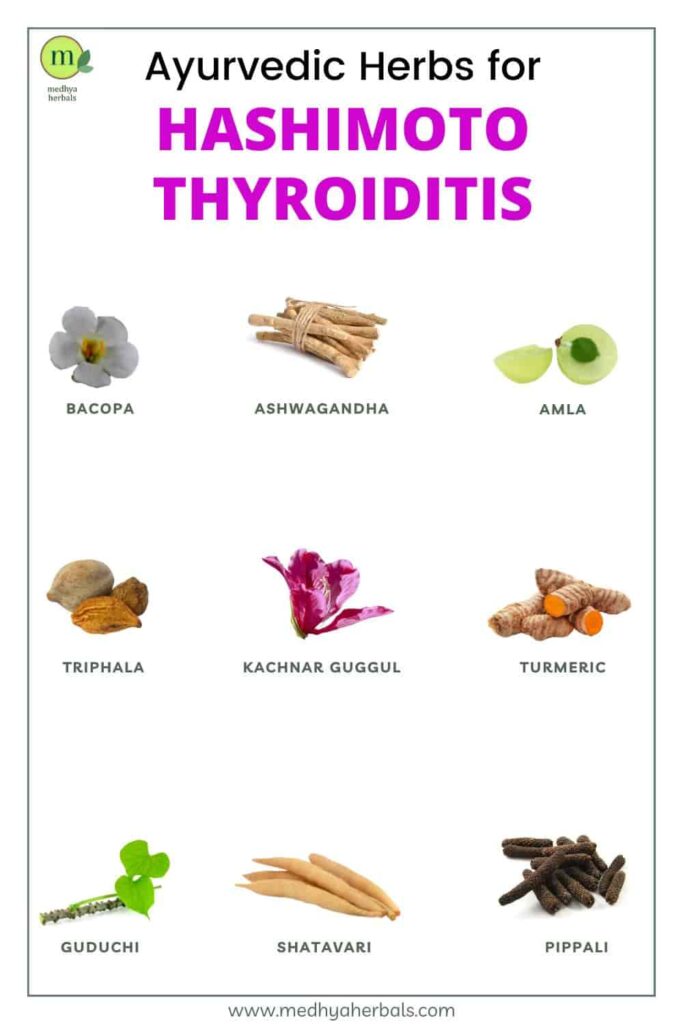
Ayurvedic herbs and medicines aim to restore the Dosha balance and to facilitate proper thyroid function. Regular use of suitable herbs can help you to improve the function of immune system, remove inflammation in the body and also restore functioning of the thyroid gland.
- Ashwagandha (Withania somnifera): This powerful adaptogenic herb can help manage stress, a known trigger of autoimmune conditions. It stimulates thyroid function and has been studied for its ability to raise thyroid hormone levels in cases of hypothyroidism, making it beneficial for those with Hashimoto’s.
- Guggulu (Commiphora mukul): Guggulu is traditionally used in Ayurveda to manage conditions related to a sluggish metabolism, making it suitable for Hashimoto’s. It has been shown to stimulate thyroid function, increase metabolism, and aid in weight management.
- Kanchanara (Bauhinia variegata): Kanchanara is a specific Ayurvedic herb used for managing glandular swellings and lymphatic congestion. In classical Ayurvedic texts, Kanchanara Guggulu, a traditional herbal formulation, is recommended for hypothyroidism and goitre.
- Brahmi (Bacopa monnieri): Brahmi is often used to combat the cognitive difficulties and mood disturbances associated with Hashimoto’s. It supports brain function, enhances memory and cognition, and helps alleviate stress and anxiety.
- Shilajit (Asphaltum punjabianum): Considered a potent rejuvenative substance in Ayurveda, Shilajit can enhance vitality and energy levels. Its rich mineral content can help supplement nutritional deficiencies common in Hashimoto’s.
- Turmeric (Curcuma longa): Its active ingredient, curcumin, has powerful anti-inflammatory and antioxidant properties, making it beneficial in autoimmune conditions like Hashimoto’s.
- Triphala: Triphala is a powerful Ayurvedic Rasayana (Herbal elixir that promotes longevity and rejuvenation). It deeply cleanses our body and helps to flush out wastes and toxins. Triphala has powerful antioxidants to rejuvenate, inhibit inflammation, promote healthy build of body cells, and blood purification.
- Amla: Amla is useful for its detoxifying qualities. It also works well to reduce cholesterol levels. That is not all. It is an anti-inflammatory agent, so it removes free radicals and helps restore hormonal balance in the body.
Panchakarma – Deep body Detoxification for Hashimoto’s Treatment
Panchakarma, a cornerstone of Ayurvedic treatment, offers promising potential for managing Hashimoto’s thyroiditis. This detoxification process aims to cleanse the body, restore balance, and rejuvenate the system. Panchakarma, which translates to “five actions,” includes therapies like therapeutic vomiting (Vamana), purgation (Virechana), enema (Basti), nasal administration (Nasya), and blood purification (Raktamokshana). These therapies aim to expel toxins and excess doshas from the body, promoting overall well-being. For Hashimoto’s patients, these practices can help reduce inflammation, balance the immune response, and support the thyroid’s functioning. Furthermore, Panchakarma’s emphasis on relaxation and stress reduction can also contribute to improved hormonal balance, a vital aspect in managing Hashimoto’s.
It’s crucial to remember that Ayurvedic treatment should be personalised, taking into account the individual’s constitution, the nature and stage of the disease, and other factors. Therefore, Ayurvedic medicines should be taken under the supervision of a qualified Ayurvedic practitioner who can customize the treatment according to your specific needs.
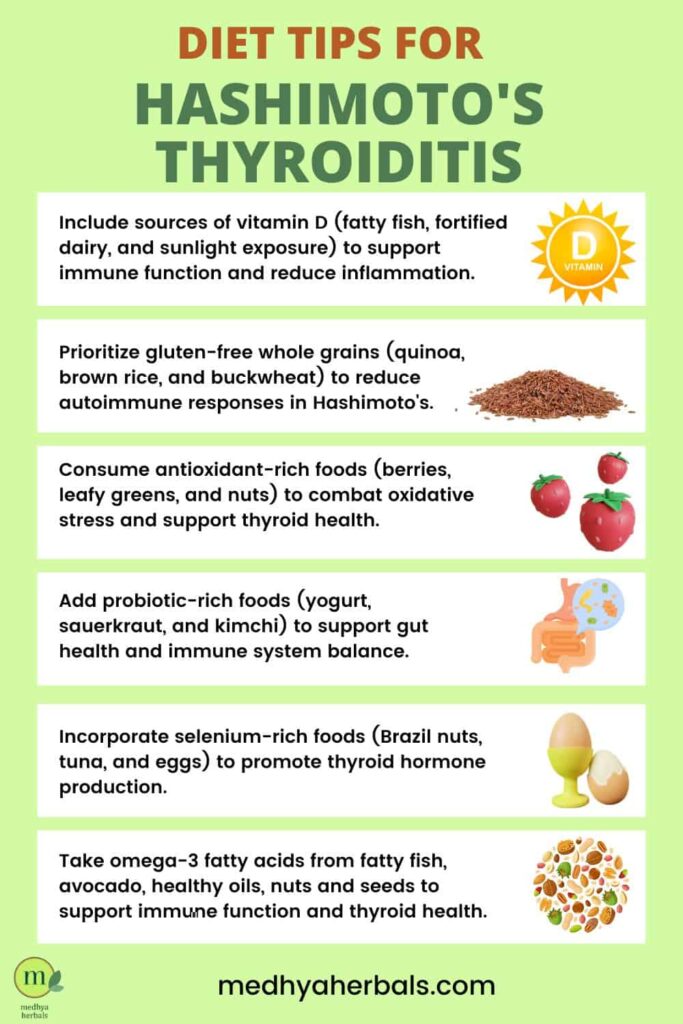
Hashimoto Thyroiditis Diet
Foods that will help to pacify the vitiated dosha will help you here. Here are the guidelines for Hashimoto’s Thyroiditis diet:
The health of our digestive fire is crucial to prevent toxin build up and support our immune system. Since, 80% of our immunity is directed by our gut; we should really take care of it with nourishing foods. This will provide support healthy digestive fire, establish gut flora and nourish the body with thyroid hormones.
- Foods rich in Magnesium: Avocado, spinach, figs, dark chocolate, chard, almonds, and pumpkin seeds
- Antioxidant rich foods such as berries, fresh vegetables, nuts and seeds
- Probiotics to support gut flora: Fermented foods, curd and naturally cultured food products
- Foods rich in Iron, Selenium and Zinc to support immune function: Nuts, Beans, Lentils, Leafy Greens (Cooked), Whole grains (cooked), Squashes, Carrots, Sweet Potato
- Healthy Fats to support thyroid gland and immune system: ghee, soaked nuts and seeds, avocado, fatty fish
- Sea vegetables such as seaweed, kelp, wakame and nori
- Favor warm over cold food
- Fix your meal times. Do not eat all the time and neither you should skip meals
Worst Foods for Hashimoto’s Thyroiditis
In general, you should avoid eating packaged foods, dried or fried foods and foods made of highly processed flours. These can disturb vata dosha and create an imbalance of the thyroid-stimulating hormone (TSH).
- Processed foods and foods heated in plastic containers. They push in lot of unwanted chemicals in the body that can trigger poor immune response.
- Goitrogens such as soy, raw cruciferous vegetables, raw leafy greens and improperly cooked whole grains. They disturb the production of thyroid hormones, which can worsen Hashimoto’s disease. Also, goitrogens block iodine, an important nutrient for the thyroid to manufacture its hormones. It is better to consume these vegetables cooked and in small amounts.
- Excessive consumption of dried, burnt, fried and stale foods. All of these foods lead to toxin build up in the body and disturb the digestive fire.
- Cold temperature foods and beverages. They disturb your dosha balance and block body channels.
- Untimely meals and or eating all the time. It disturbs the blood sugar balance, dosha and digestive fire.
- Excessive sugar, chili and oil from fried snacks, pastries and candies.
Yoga Asanas (poses) for Autoimmune Thyroid Condition
Regularly practicing yoga can significantly help in the treatment of Hashimoto Thyroiditis. While, there are lots of yoga asanas you can try, the key to benefit from yoga is to make a routine and stick to it. Some yoga asanas that can be helpful with thyroid include the following.

- Sarvangasana (shoulder stand pose): This pose allows blood flow from the legs to the head region. Thus, it helps to stimulate the thyroid gland and control thyroxin.
- Matsyasana (Fish Pose): This stretches the neck and, by so doing, stimulates the thyroid gland.
- Bhujangasana (Cobra Pose): This pose improves blood circulation and flexibility in the back and abdomen. It also helps reduce stress and fatigue.
- Sirshasana (Headstand Pose): This acts directly on the thyroid glands.
- Setubandhasana (Bridge Pose): It also stretches the neck to activate the thyroid glands.
- Halasana (Plough Pose): By compressing the neck, halasana stimulates the abdominal and thyroid glands. It also helps in reducing fatigue and stress and calms the brain too.
- Other poses include the corpse pose, fish pose, legs-up-the-wall pose, boat pose, camel pose, cobra pose, and many more.
Ayurvedic Lifestyle to Support Thyroid Function
Ayurveda is not just a medical system. It is a lifestyle on its own. If you can give yourself to it, you will enjoy better health around you. Do note that Ayurveda incorporates lifestyle modifications into every disease management strategy.
There would be no sense in attempting to balance your doshas if you keep ruining it with poor lifestyle choices. In the case of thyroiditis, lifestyle changes include:
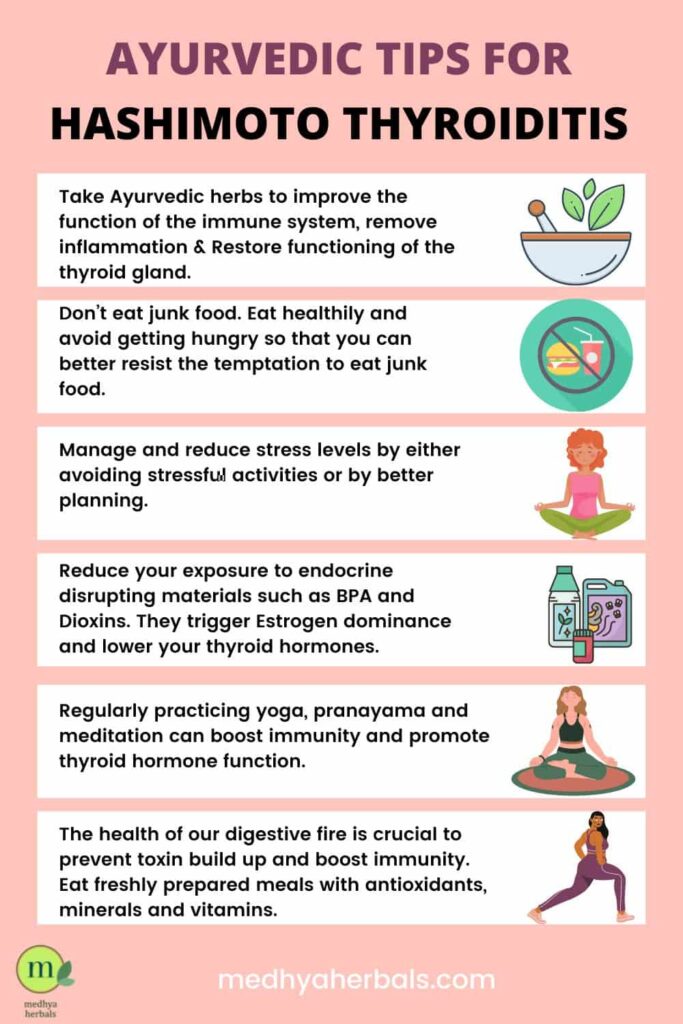
- Manage and reduce stress levels by either avoiding stressful activities or by better planning. Stress is one sure way to get your hormones out of whack.
- Practice regular meditation and breathing exercises (pranayama) that will help you to relax and reduce your stress levels.
- Reduce your exposure to endocrine disrupting materials such as BPA and Dioxins. They trigger Estrogen dominance and lower your thyroid hormones.
- Restrict your use of hormone-based contraceptives. If you can, avoid them completely.
- Replace tea and coffee with herbals tea.
- Avoid alcohol and smoking altogether. They are highly drying, disturb dosha balance and lead to toxin build up in the body.
- Abhyanga or regular massage will help to improve circulation in the body
- Don’t eat junk food. Eat healthily and avoid getting hungry so that you can better resist the temptation to eat junk food.
- Keep a regular, again, regular, sleep pattern in the night. Learn here on Ayurvedic guidelines for good sleep.
- Try not to sleep in the day so you don’t break your sleep cycles.
- Regular exercise to promote strength and balance.
- Avoid excessive exercise and stressful physical activity.
- Rest and restoration is highly important for Hashimoto’s Disease patient as it is primarily a Vata imbalance disorder. So, always maintain balance and don’t go over the board.
Conclusion
Living with Hashimoto’s Thyroiditis can be a challenging journey. The symptoms can sometimes feel overwhelming, and finding a treatment that works for you may seem like a daunting task. We understand that it’s not just about managing the symptoms; it’s about finding a solution that treats the root cause of your health issues. And that’s where Ayurveda, with its holistic and personalised approach, shines.
Ayurveda goes beyond treating just the physical symptoms. It dives deeper into correcting imbalances that give rise to the disease. By employing Ayurvedic therapies, tailored diets, herbal medicines, and lifestyle modifications, we aim to stimulate your body’s natural healing process and provide long-lasting relief.
At Medhya Herbals, our skilled Ayurvedic Doctors are committed to crafting personalised treatment plans that align with your unique health needs. Because no two individuals are the same, your wellness journey shouldn’t be either. Don’t wait any longer – schedule a consultation with us to discover how Ayurveda can offer a personalized, root cause treatment for Hashimoto’s Thyroiditis. Together, we can set you on the path to improved health and wellness.
FAQ
Can the progression of Hashimoto’s be stopped?
Hashimoto’s thyroiditis is an autoimmune disorder where the immune system attacks the thyroid gland, leading to chronic inflammation and often hypothyroidism. While there is no known cure for Hashimoto’s, its progression can often be managed. Lifestyle changes, including a balanced, nutrient-dense diet that avoids known triggers, stress management, and regular monitoring, can play a vital role. Medication, such as thyroid hormone replacement therapy, may be necessary to manage symptoms and maintain normal thyroid hormone levels. Regular follow-up with healthcare providers, including endocrinologists, is essential to monitor and manage the disease effectively. Though it may not be possible to completely stop the progression, many individuals can lead normal, healthy lives by following a tailored treatment plan.
Can your thyroid recover from Hashimoto’s?
In Ayurveda, Hashimoto’s thyroiditis is approached holistically, focusing on balancing the body’s energies (doshas) and improving overall well-being. In my treatment for thyroiddisorders, I emphasize dietary adjustments, herbal supplements, stress reduction techniques, and detoxification therapies (Panchakarma) to support thyroid function. While these holistic measures may not cure the condition, Ayurvedic treatment can significantly help to soothe the inflammation and possibly support the recovery of thyroid function to some extent (depending on the stage of Hashimoto’s Thyroiditis).
Can Hashimoto antibodies go away?
Hashimoto’s thyroiditis is characterized by the presence of antibodies against thyroid proteins, such as thyroid peroxidase (TPO) and thyroglobulin. These antibodies contribute to the autoimmune attack on the thyroid gland. In some cases, particularly with intervention and lifestyle changes, the levels of these antibodies may decrease. However, it’s rare for them to disappear entirely once they have developed. Treatment for Hashimoto’s often focuses on managing the symptoms and underlying hypothyroidism rather than the antibodies themselves. Regular monitoring of thyroid function and symptoms is more commonly practiced than tracking antibody levels. Even if antibodies decrease, ongoing management of the condition may still be necessary, as the absence of antibodies does not necessarily signify a resolution of the disorder.
What is last stage of Hashimoto’s thyroiditis?
Hashimoto’s thyroiditis is a chronic autoimmune condition that affects the thyroid gland. Unlike some diseases, Hashimoto’s doesn’t have a universally recognized staging system, including a defined “last stage.” However, the progression of Hashimoto’s can lead to complete or near-complete destruction of the thyroid gland over time. In this advanced state, the thyroid’s ability to produce hormones is severely compromised or entirely lost, resulting in hypothyroidism. This condition requires lifelong treatment with changes in diet, lifestyle, and herbal supplements to counter inflammation. In some cases, where thyroid function is compromised, one may need thyroid hormone replacement therapy to manage the symptoms and prevent complications. Regular monitoring by healthcare providers is essential to adjust treatment as needed and ensure optimal thyroid hormone levels. While Hashimoto’s thyroiditis may lead to permanent changes in the thyroid gland, it is a manageable condition, and many individuals can lead normal, healthy lives with appropriate care and treatment.
Does Hashimoto’s get worse with age?
Hashimoto’s thyroiditis can indeed change over time, and for some individuals, it may appear to worsen with age. As the autoimmune attack on the thyroid gland continues, it can lead to progressive damage to the thyroid tissue, often resulting in a gradual decline in thyroid function. This decline can lead to hypothyroidism, where the thyroid gland is unable to produce sufficient thyroid hormones, leading to symptoms such as fatigue, weight gain, and sensitivity to cold. Older adults may be more susceptible to these symptoms, and other age-related health conditions may exacerbate them. Regular monitoring and appropriate treatment, typically including thyroid hormone replacement therapy, are essential to manage the condition effectively as it evolves. Individual experiences can vary, so ongoing care and communication with healthcare providers are crucial to adapt the treatment approach to each person’s unique situation and needs.
Is TSH always high with Hashimoto’s?
Thyroid-stimulating hormone (TSH) levels can be high in Hashimoto’s thyroiditis, but it’s not always the case. Hashimoto’s disease often leads to hypothyroidism, where the thyroid gland is underactive and doesn’t produce enough thyroid hormones. In response, the pituitary gland releases more TSH to stimulate the thyroid, leading to elevated TSH levels. However, Hashimoto’s can present with normal or even low TSH levels, especially in the early stages or if the thyroid is temporarily overactive (a phase called Hashitoxicosis). The complex nature of Hashimoto’s means that TSH levels can fluctuate, and a comprehensive evaluation, including other thyroid hormone levels and antibodies, is typically necessary for a complete understanding of the thyroid function in someone with this condition.
Can Hashimoto’s Thyroiditis be treated?
Ayurveda offers a comprehensive approach to managing and treating Hashimoto’s thyroiditis, focusing on treating the person as a whole rather than just managing symptoms. The key principle of Ayurveda in treating autoimmune conditions like Hashimoto’s is to restore balance in the body and enhance the body’s innate healing capacity. This is achieved through a combination of diet modifications, herbal remedies, and lifestyle practices, all tailored to the individual’s unique constitution. Specific Ayurvedic herbs such as Ashwagandha and Guggulu have demonstrated potential in supporting thyroid function and balancing the immune response. Panchakarma, a detoxification procedure, can be particularly beneficial in removing toxins and reducing inflammation. Ayurveda’s personalized and holistic approach can significantly contribute to managing Hashimoto’s thyroiditis, improving quality of life, and potentially bringing about a state of remission in the condition
Does Hashimoto’s weaken your Immune System?
Hashimoto’s thyroiditis is an autoimmune disorder, which means that the immune system is not necessarily weakened, but rather it is misdirected. In Hashimoto’s, the immune system mistakenly identifies the thyroid gland as foreign and launches an immune attack against it. This leads to inflammation and damage to the thyroid gland, which over time can reduce the gland’s ability to produce thyroid hormones (a condition known as hypothyroidism).
While Hashimoto’s does not directly weaken the immune system, it does indicate an imbalance or dysregulation within the immune system. Autoimmune disorders like Hashimoto’s are thought to arise from a combination of genetic susceptibility and environmental triggers, which can lead to this dysregulation of the immune system.
Furthermore, individuals with one autoimmune disease, such as Hashimoto’s, may be at a higher risk for developing other autoimmune conditions. This isn’t because the immune system is weakened, but rather because the immune system is overactive or misdirected.

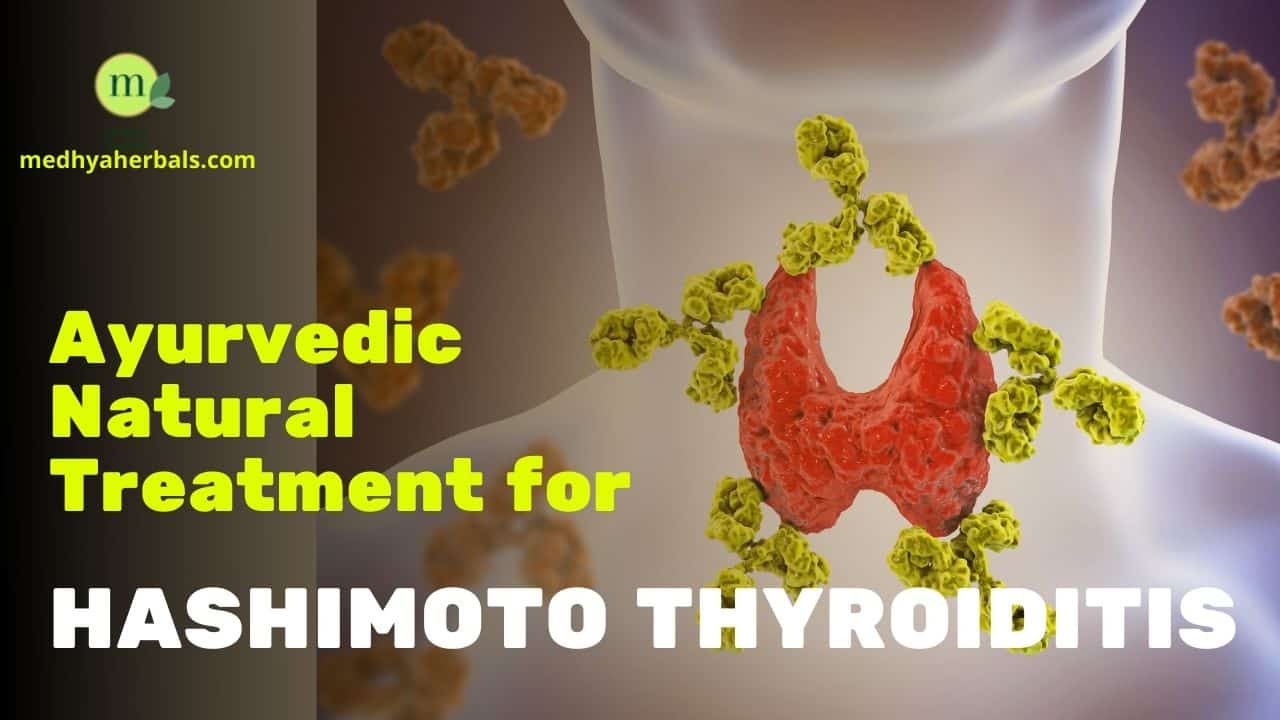
Hello, I am suffering from hashimoto thyroiditis from past 4 yrs took homeopathy and ayurvedic treatment . Not tried allopathy but everyone are forcing to start allopathy. Recently my haemoglobin came down from 12 to 9.1 and esr to 90 , dr asked me to check with allopathy and they prescribed cefodem 200 for 15 days wherein my haemogn increased to 9.9 and esr to 32. I have non alcoholic fatty liver and all the symptoms of thyroid esp very thin hair . I’m 43 yrs old and none has thyroid in my family but my marriage life was very stressful but recently it’s better.
I want to cure through ayurveda, I’m based in Bangalore. Hoe much the treatment cost and any specific duration.
Hi! Thank you for your message. Our doctors will help you out. Please connect with us over an email health@medhyaherbals.com or whatsapp +6581286582 for further guidance.